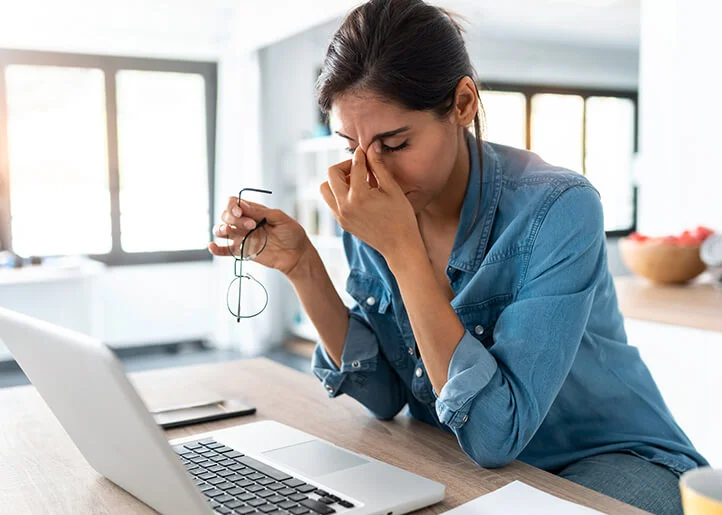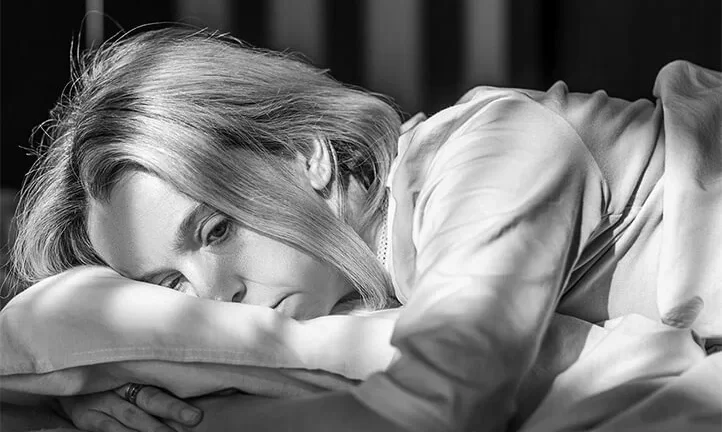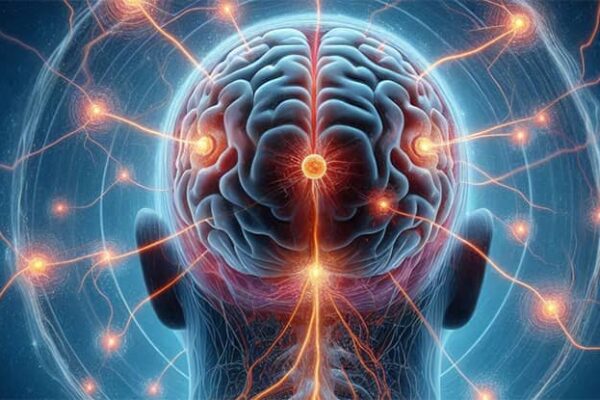Moderate Depression (or Moderate Clinical Depression) is a mental disorder that can limit an individual’s ability to function normally, work, and maintain healthy relationships. It is characterized by significant and persistent symptoms of depression that affect daily life but are not as severe as in cases of major depression.
The importance of addressing moderate depression cannot be underestimated. This condition has a substantial impact on a person’s physical and emotional well-being and can lead to serious health issues, including an increased risk of cardiovascular diseases, a weakened immune system, and even suicidal thoughts or actions.
Moderate depression also affects professional life, reducing focus and productivity, which can result in job loss and financial difficulties.
On the level of family and personal relationships, moderate depression often leads to conflicts, the breakdown of partnerships, and isolation.
All of this highlights the importance of timely diagnosis and treatment of this condition, as well as the need to disseminate information and raise public awareness on this issue.

How Does Moderate Depression Differ from Mild and Severe Forms?
Moderate depression occupies an intermediate position between mild and severe forms of this disorder. Here are some key differences:
Comparison with Mild Depression
- Symptoms:
- In moderate depression, the symptoms are more pronounced and interfere with daily functioning. This may include persistent sadness, loss of interest in usual hobbies, sleep, and appetite issues.
- Impact on Daily Life:
- Moderate depression can significantly limit a person’s ability to work, study, or maintain relationships compared to mild depression.
Comparison with Severe Depression
- Symptoms:
- Unlike severe depression, the symptoms in moderate depression are less intense, and suicidal thoughts or psychotic features are less common.
- Impact on Daily Life:
- While moderate depression can significantly impair an individual’s quality of life, severe depression often makes everyday independent functioning impossible.
- Duration and Intensity:
- Severe depression is usually characterized by prolonged and intense symptoms that may require hospitalization or intensive treatment. Moderate depression lasts for several weeks or months, typically longer than mild depression but not as long as the severe form of this condition.
- Treatment:
- Treatment for moderate depression may be less intensive (e.g., consultations with a psychologist), while severe depression usually requires a comprehensive and intensive approach, often including medication therapy.
Thus, understanding these differences is key to correctly identifying and treating different forms of depression.

Symptoms and Manifestations of Moderate Depression
The symptoms and manifestations of moderate depression include a range of physical, emotional, and cognitive indicators that go beyond mild discomfort or temporary sadness but are less critical than in the case of severe depression.
Emotional Symptoms
- Persistent sadness or hopelessness. Feelings of sadness or despair that do not go away, even with changing circumstances.
- Feelings of worthlessness or guilt. Constant self-blame or criticism; focusing on past mistakes, guilt, or self-criticism.
- Loss of interest in various hobbies, activities, or social gatherings.
Physical Symptoms
- Changes in appetite and weight. Unexpected weight loss/gain or changes in appetite.
- Sleep problems. Insomnia or, conversely, a constant desire to sleep.
- Persistent fatigue. Feeling exhausted even after adequate sleep, lack of energy.
Cognitive Symptoms
- Impaired concentration. Problems with focus, memory, and decision-making.
- Suicidal thoughts. Mixed or recurring thoughts of suicide (not always present).
Other Symptoms
- Physical pain. Unexplained body aches, headaches, digestive issues that do not improve even after treatment.
- Agitation or retardation. Noticeable slowing of movements or nervous agitation.
These symptoms can affect all aspects of a person’s life, including work, study, personal life, and health. If you experience one or more of these symptoms, you should seek medical help.

What Can Cause Moderate Depression?
Moderate depression can arise from various life circumstances. Here are some examples of such situations:
- Loss of a loved one. The death of a relative, friend, or another close person can cause deep feelings of sadness and loss.
- Divorce or relationship breakup. The end of an important relationship can cause feelings of loneliness and despair.
- Work problems or unemployment. Professional difficulties, including job loss, can lead to financial and emotional problems.
- Financial difficulties. Debts, poverty, or other financial troubles can cause stress and anxiety.
- Chronic illnesses. A diagnosis or struggle with chronic diseases can become a source of constant stress and despair.
- Injuries or accidents. Physical injury or an accident can lead to prolonged physical and emotional stress.
- Social isolation. Lack of social support or isolation can cause feelings of loneliness and depression.
- Major life changes, such as moving, changing careers, or retiring, can be stressful.
- Violence. Memories of physical or emotional violence can also trigger depression.
Psychological and Physiological Factors
Moderate depression can be caused by various psychological and physiological factors or a combination of them. Here are some examples:
Psychological Factors
- Traumatic experiences, such as violence or loss, can affect a person’s emotional state, causing depression.
- Stress and anxiety. Prolonged nervous tension and high levels of stress can contribute to the development of depression.
- Low self-esteem or constant negative thoughts about oneself can lead to depressive states.
- Unresolved emotional conflicts or problems that have not been addressed can accumulate and cause depression.
Physiological Factors
- Chemical imbalance in the brain. An imbalance of neurotransmitters in the brain can contribute to depression.
- Hormonal changes, such as menopause or pregnancy, can cause depression.
- Heredity. A genetic predisposition to depression can be passed down from generation to generation.
- Chronic illnesses can contribute to depression.
- Side effects of medications. Some medications have side effects that can cause depression.
Awareness and understanding of these factors help in identifying and treating moderate depression, as well as preventing its development in the future.

Self-Diagnosis and Professional Evaluation
Self-diagnosis and professional evaluation are crucial aspects of identifying and treating depression.
Self-Diagnosis
- Self-observation. Pay attention to your emotions, feelings, and behavior. Do you feel persistent sadness, loss of interest, fatigue, or hopelessness?
- Online tests. Try taking an online test for depression and anxiety, which may help assess your symptoms.
- Symptom journal. Keep a record of your symptoms, emotions, and thoughts for discussion with a doctor.
Professional Evaluation
- Consultation with a doctor. Visit a doctor to discuss your symptoms, medical history, and undergo a physical examination.
- Diagnostic tests. The doctor may suggest psychological testing and evaluation.
- Consultation with a psychiatrist or psychologist. A specialist can conduct a detailed assessment of your condition and develop a treatment plan.
Remember that self-diagnosis is the first step toward getting help, but for an accurate diagnosis and developing a comprehensive treatment approach, you should consult professionals.
Diagnostic Tools and Questionnaires
Diagnostic tools and questionnaires help doctors and psychologists determine the presence and severity of depression. Below are some of the most common tools for diagnosing depression:
- The Beck Depression Inventory (BDI) is one of the most widely used self-assessment tests for measuring depression symptoms.
- The Hamilton Depression Rating Scale (HDRS) is a test for assessing depression, commonly used in medical practice.
- The Center for Epidemiologic Studies Depression Scale (CES-D) is a popular self-assessment test that measures depression symptoms.
- The Montgomery-Asberg Depression Rating Scale (MADRS) is a tool used to assess the severity of depression and response to treatment.
- The Quick Inventory of Depressive Symptomatology (QIDS) is a scale that measures depression symptoms for quick diagnosis and monitoring.
- The Depression, Anxiety, and Stress Scales (DASS) is a general tool for assessing the range of symptoms related to depression.
It’s important to remember that taking these tests on your own is not a substitute for professional diagnosis, but it can be a helpful first step in seeking help.

Methods for Overcoming Moderate Depression
Although moderate depression is not as severe as its more intense forms, it still requires attention and timely treatment. There are many proven ways to overcome this condition that can help restore mental balance and bring back the joy of life. However, it’s important to understand that the right choice of method depends on individual characteristics, as well as the causes and symptoms of depression.
Before deciding on a treatment method, it’s necessary to consult with a psychiatrist, psychologist, or psychotherapist. A professional will help create a comprehensive treatment plan that considers all aspects of your condition. The goal is to find the most effective and safe path to restoring mental health.
Overcoming moderate depression is not only about taking medication or visiting a psychotherapist. It also includes lifestyle changes, proper nutrition, physical exercise, and other self-help methods that can be successfully combined to achieve the best results.
While there are various approaches to treating depression, it’s important to choose only those methods that have scientific support and have been successfully tested. Therefore, work with a specialist to ensure the most effective and safe approach to treating depression.
Psychotherapy
Psychotherapy is a key component in treating moderate depression. There are different forms of psychotherapy, each of which can be useful depending on the specific case:
- Cognitive Behavioral Therapy (CBT) focuses on identifying and changing negative thought patterns and behaviors.
- Humanistic or Client-Centered Therapy emphasizes self-development and self-awareness.
- Psychodynamic Therapy focuses on uncovering unconscious conflicts and feelings.
- Family Therapy or Couples Therapy involves working with families and couples to resolve conflicts and improve communication.
Choosing a Psychotherapist
Choosing the right psychotherapist is an important step toward recovery. Here are some recommendations:
- Diploma and qualification. Make sure the psychotherapist has the appropriate state-recognized diploma and qualification to practice.
- Specialization. Look for a therapist who specializes in treating depression and has experience with similar cases.
- Trust. It’s important to feel comfortable communicating with the specialist. You should feel you can trust them.
- Treatment methods. Find out what treatment methods the therapist uses and make sure they suit you.
- Reviews and recommendations. Analyze reviews from other patients or seek recommendations from friends and family.
Pharmacotherapy
Antidepressants are one of the main forms of pharmacological therapy for treating moderate depression. They work by correcting the levels of neurotransmitters in the brain, which affect mood and emotional state.
- Selective Serotonin Reuptake Inhibitors (SSRIs). Usually recommended as the first line of treatment for depression.
- Tricyclic Antidepressants (TCAs). Can be effective but have more side effects.
- Monoamine Oxidase Inhibitors (MAOIs). Used less frequently due to side effects and interactions with food.
Tips for Safe Medication Use
- Consultation with a doctor: Do not start or stop taking antidepressants without consulting your doctor.
- Adherence to dosage: Follow the prescribed dosage and schedule.
- Side effects: Inform your doctor about any side effects or changes in your well-being.
- Patience: Give your body time to adjust to the medication—antidepressants typically take several weeks to show effectiveness.
- Avoid sudden discontinuation: Stopping antidepressants abruptly can cause withdrawal symptoms.
- Healthy lifestyle: Combine antidepressant use with a healthy lifestyle, balanced diet, and physical exercise.
Remember, antidepressants are just one component of a comprehensive approach to treating depression, which may also include psychotherapy, self-help, and other strategies.
Lifestyle Changes: Proper Nutrition and Physical Activity
Proper nutrition plays a crucial role in maintaining mental health and combating depression. Here are the key recommendations:
- Balanced diet: Include plenty of vegetables, fruits, grains, protein, and healthy fats in your diet.
- Vitamins and minerals: Ensure adequate intake of vitamins (especially B, D) and minerals.
- Limiting harmful products: Try to limit the intake of alcohol, coffee, sugar, and processed foods.
- Regular meals: Don’t skip breakfast, lunch, or dinner, and maintain a regular eating schedule.
- Adequate water intake: Keep your body well-hydrated.
Physical activity is also extremely important for improving mood and reducing depression symptoms.
- Regular exercise: Engage in physical activity for at least 30 minutes a day.
- Variety of exercises: Include aerobic exercises, strength training, yoga, or Pilates.
- Outdoor walks: Spend time outdoors and get enough sunlight.
- Group sports: Consider participating in group sports or other physical activities.
- Consistent physical activity: Make exercise a part of your daily routine.
By choosing a healthy lifestyle with proper nutrition and physical activity, you can significantly improve your emotional state and strengthen your health, helping you overcome moderate depression.
Meditation and Mindfulness Practice
The use of meditation and mindfulness can be effective in maintaining mental health and overcoming moderate depression. Both practices involve focusing on the present moment, helping to reduce anxiety and stress, which often accompany depression.
Meditation
- Meditation techniques: Learning different meditation techniques will help you find the most suitable method for you.
- Consistency: Regular practice improves focus, emotional resilience, and inner harmony.
- Community: Consider joining a meditation group for support and guidance.
Mindfulness
- Mindfulness techniques: Apply mindfulness practice throughout the day to maintain inner focus.
- Daily practice: Integrate mindfulness into daily activities and routines such as eating, walking, or doing household chores.
- Courses and retreats: Consider participating in mindfulness courses or retreats to deepen your practice.
Meditation and mindfulness play a significant role in restoring inner peace and strengthening resources to overcome moderate depression. They can be used independently or as a complement to other treatment methods.
Art Therapy and Other Non-Standard Methods
Non-standard methods can be quite effective in combating moderate depression, strengthening mental health, and improving overall well-being.
- Art therapy is a method that involves creating art as a means of self-expression and self-analysis. Through drawing, sculpture, crafts, or other forms of art, people express their feelings, explore the causes of their depression, and find ways to overcome it.
- Music therapy helps improve mood, reduce stress and anxiety, and enhance concentration and relaxation.
- Animal-assisted therapy or interaction with animals promotes emotional healing, providing comfort, support, and unconditional love.
- Nature therapy or spending time in nature also has a positive impact on mental health, strengthening the connection with nature and providing peace.
Each of these methods has its own features that can be adapted to an individual’s needs.

Practical Steps to Restoring Emotional Balance
Restoring emotional balance after a period of depression is a process that requires time, patience, and dedication. It’s important to remember that everyone is unique, and what helps one person may not be effective for another.
Understand that the recovery process is not only about overcoming the symptoms of depression but also about improving the quality of life, restoring lost connections, and finding joy and satisfaction in life.
Restoring emotional balance is an ongoing effort, not just a battle against depression, but also a journey toward building resilience, emotional stability, and personal growth.
Remember that self-care is a key element of restoring mental well-being, and it’s never too late to start this important process. Don’t hesitate to seek help and support from family, friends, or professionals.
Developing a Personal Recovery Plan
Developing a personal recovery plan is a well-known and effective way to overcome depression. It helps to structure the path to health and well-being, taking into account your personal needs, goals, and resources. The main stages of this process are outlined below.
- Self-assessment and goal setting: The first step in developing a personal recovery plan is self-assessment. It’s important to honestly and objectively evaluate your condition, identify specific issues you’re struggling with, and set clear and achievable goals for yourself.
- Consultation with a professional: You should consult a mental health professional who can help create a recovery plan that takes into account your symptoms, medical history, and other important factors.
- Choosing appropriate strategies and methods: At this stage, you and your specialist discuss and select the recovery methods and strategies that will be most effective for you. This may include meditation therapy, psychotherapy, lifestyle changes, and more.
- Monitoring and adjusting the plan: After implementing the plan, it is important to regularly assess its effectiveness and make changes if necessary. Feedback from the specialist and self-monitoring are key to successful recovery.
- Support and self-care: Ensure you have proper support from family or friends. Also, consider the importance of self-care and pay attention to both your physical and mental health.
Remember that developing a personal recovery plan is a process that requires cooperation and a willingness to make changes on your part.
Ongoing Self-Support and Self-Monitoring
Ongoing self-support and self-monitoring are essential components of successfully overcoming moderate depression. They help to ensure stability and support throughout the recovery process, as well as promote early identification and correction of potential issues.
- Provide yourself with emotional support by connecting with family, friends, or support groups who understand your struggles and feelings.
- Make time for activities that you enjoy, that bring you joy and peace.
- Remember the importance of physical activity and healthy eating.
- Educate yourself as much as possible about depression and its treatment.
- Regularly evaluate your emotional state. This will help you detect changes early and take necessary actions.
- Maintain regular contact with your therapist to discuss your progress and potential adjustments to your treatment plan.
- Keep a journal to record your feelings, thoughts, and progress. It will be a valuable tool when discussing your condition with a specialist.
Keep in mind that self-support and self-monitoring are long-term, ongoing processes that require attention, patience, and resilience but are crucial for maintaining mental health and overall well-being.

Motivational Booster
In conclusion, I want to emphasize that moderate depression is a serious condition that requires attention and a professional approach. Do not ignore your feelings and symptoms. Restoring emotional balance is a comprehensive process that includes psychotherapy, possibly pharmacotherapy, lifestyle changes, meditation, and other methods.
It is important to develop a personalized recovery plan, continually support yourself, monitor your condition, and not hesitate to seek help from professionals and loved ones.
Don’t delay in treating moderate depression! Time is a critical factor for successful recovery and preventing the progression of depression into a more severe state. Encourage yourself and your loved ones to take active steps towards health and well-being.
Each of us has the strength to change our lives even in the darkest times. Remember, you are not alone in the fight against moderate depression. By joining forces with family, friends, and professionals, you will receive immense help and support. Don’t forget about your inner strength, self-respect, and self-love.
Let this journey to recovery be an exploration of self-discovery and self-love. Discover new horizons, new interests, and passions. This is a time when you can transform yourself, your life, and your values.
Don’t stop at what you’ve achieved. Every day brings new opportunities and perspectives. Let your faith, hope, and courage be your steadfast companions on this path to healing and recovery.
Life is beautiful, and it’s waiting for you. You are strong, you are valuable, and your feelings matter. Don’t deny yourself joy, happiness, and love. You deserve it!




